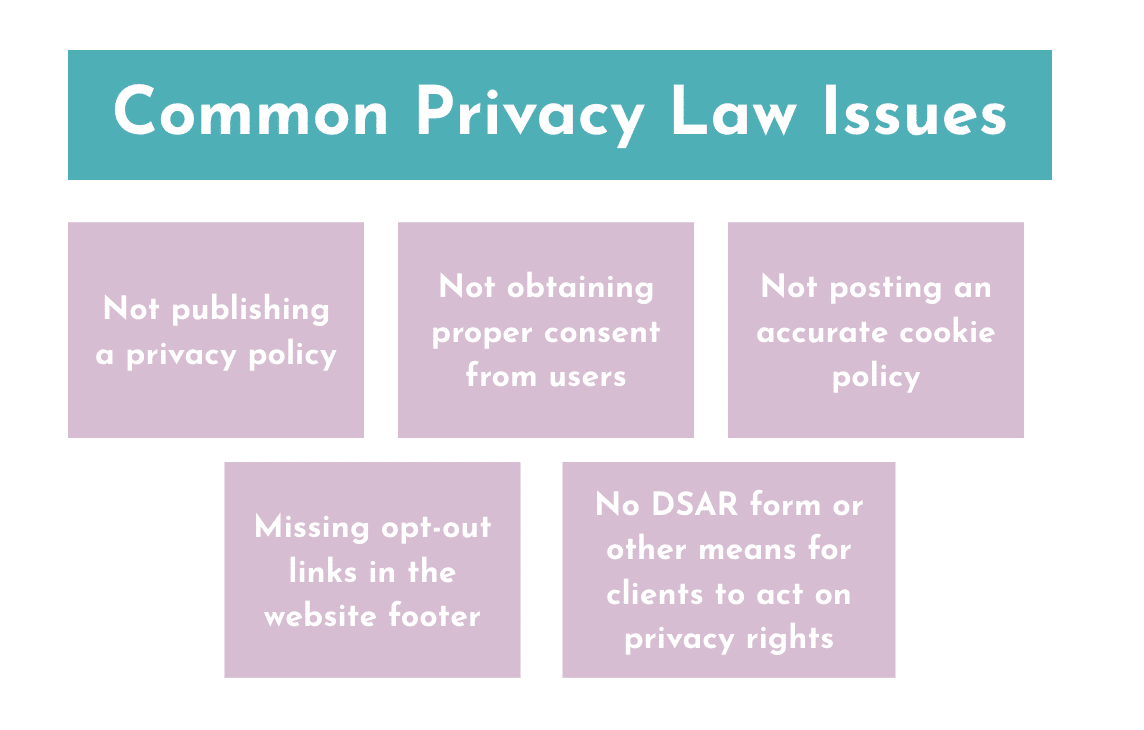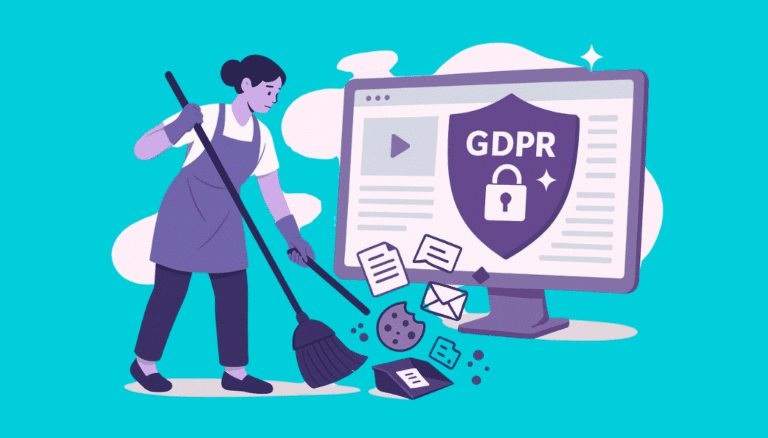Table of contents
“I didn’t know I could get fined for that!“
Did you know that small cleaning businesses and maid services are subject to complying with certain data privacy laws?
Legislation like the General Data Protection Regulation and the California Online Privacy Protection Act (CalOPPA) have broad scopes and impact websites that track online user behaviors of visitors in protected regions. They also apply if you’re based in those regions or you target consumers in those regions.
This means your cleaning services website may need to meet certain data privacy requirements to align with these laws and avoid getting fined for noncompliance and suffering damage to your brand reputation.
Keep reading to learn all about the privacy laws that might affect your business and how to avoid common compliance issues.
Privacy Laws Might Apply to Your Cleaning Business
According to Thales, there are consumer data privacy laws in over 120 countries around the world — if your cleaning service has a website, then there’s a good chance at least one of these laws applies to you.
For example, if you’re based in Europe or if your website targets visitors from Europe and you track their online behaviors in any way, you need to follow the GDPR, the world’s strictest privacy law.
If you’re based in California or if you target users from California who can access your website, you’re subject to following CalOPPA, one of the premier laws obligating businesses to have regulated privacy policies.
Here’s a list of privacy laws to consider:
- General Data Protection Regulation
- California Consumer Privacy Protection Act
- California Online Privacy Protection Act
- Canada’s Personal Information Protection and Electronics Documents Act
- Australia’s Privacy Act 1988
- Brazil’s General Data Protection Law
- New Zealand’s Privacy Act 2020
- U.S. state-level laws (20+ so far)
Cleaning services usually have websites that collect information from site visitors, but you also might collect and store physical copies of information from your clients. This data is still protected by most privacy laws and is subject to the same legal requirements.
What do these laws require from small businesses?
While the specific requirements depend on which laws apply to your cleaning business, most of these privacy laws require the following data privacy best practices:
- Post an honest, easy-to-read privacy policy
- Present users with a compliant consent banner for cookies and trackers
- Link an accurate cookie policy to your cookie banner to keep users informed
- Inform users of their privacy rights over their personal information
- Inform users how they can act on their privacy rights
- Provide users with your company’s contact information if they have questions or concerns
- Deploy security measures to keep digital and physical copies of data safe from unauthorized access, breaches, and leaks
Penalties for non-compliance
Penalties for not complying with the law depend on which privacy law you violate, but the amounts can be significant.
If you violate the GDPR or other similar laws, you could receive a fine of up to €10 million or 2% of your global annual turnover for less severe violations, to a maximum of €20 million or 4% of your annual turnover, whichever is highest.
If you violate most U.S. state-level laws, you could receive a fine of up to $2,500 per unintentional or less-severe incident, and up to $7,500 per intentional or more severe incident.
Some laws also outline criminal and civil penalties.
Under the CCPA, consumers have a right to pursue civil action against you if their information is in your care and is accidentally leaked or breached without proper permissions.
One thing is clear: the risks associated with violating privacy laws are very real. Fortunately, they’re also very avoidable.
QUICK TIP FROM THE AUTHOR

Don’t let cancellations clean you out!
Steal our foolproof cancellation policy and start protecting your revenue.
- 7 must-know tips for the perfect cancellation policy
- 4 ready-to-use, editable templates for your maid service
- A copy-and-paste notification to send to your current customers
It’s time to stop losing money to cancellations. Grab it now!

Common Privacy Law Issues and How to Avoid Them
Here are some common privacy law issues small businesses often make, and some actionable tips to help you avoid them:

Not publishing a privacy policy
Cleaning businesses might think they don’t need to publish a privacy policy, but this is a mistake for several reasons:
- If privacy laws apply to you, you’re required to have a compliant privacy policy
- Having a privacy policy helps you secure and maintain trust with clients
- Being honest about how your cleaning business collects data is the right thing to do
To avoid this issue, you can easily make a privacy policy for your site by using tools like a privacy policy generator. These ask simple questions about your business and make a unique policy for you based on your answers and your compliance needs.
Generators are easy to use, affordable, and keep you better aligned with applicable laws.
Not obtaining proper consent from users
Another mistake some cleaning businesses make is not having the proper consent management features on websites.
If your site uses internet cookies, it should also have an interactive consent banner that requests users to “Accept” the cookies, “Deny” them, or “Customize” them to set their preferences. They should also have access to a preference center where they can change their minds at any time, which is required by laws like the GDPR and CCPA.
Managing user consent sounds very technical and overwhelming, and it certainly can be if you try to handle it all alone. Instead, avoid this issue by using a comprehensive cookie consent manager or CMP.
There are lots of CMPs out there to choose from. Look for one like what Termly offers. It comes in different price ranges based on your needs, and has features like multi-regional support, a customizable banner, high ratings, and a strong customer support team.
Not posting an accurate cookie policy
It’s also very common for cleaning business websites to not post a cookie policy, but this should be avoided, especially if your website deploys them on users’ browsers.
Internet cookies and other trackers collect and process personal data from website visitors, and they do fall under the legal obligations of privacy laws.
Reliable CMPs, like Termly’s, feature a website scanner that detects, labels, and categorizes cookies and a generator that makes an accurate cookie policy based on these scans.
Missing opt-out links in the website footer
If you fall under laws like the CCPA, your cleaning website should have specific links in the footer to comply with portions of the law.
These links typically lead to pages where your users can request to follow through on their privacy rights, which typically include the right to:
- Know what data is collected about them
- Correct the data
- Delete the data
- Obtain a portable copy of the data
- Opt out of targeted advertising and direct marketing
- Opt out of having their sensitive personal information tracked
- Opt out of the sharing or selling of their data to third parties
Specifically, the CCPA required websites to have the following links in the footer:
- “Do not sell or share my personal information”
- “Limit the use of my sensitive personal information”
Using a CMP can help you avoid this issue, as many include CCPA-compliant opt-out links as a feature.
No DSAR form or other means for clients to act on privacy rights
Speaking of privacy rights, cleaning businesses should have a Data Subject Access Request (DSAR) form linked somewhere on their website that’s clearly labeled and easy for users to find.
A DSAR is recommended by nearly all privacy laws, although only the GDPR refers to them by this name.
DSAR forms help website users easily submit requests to follow through on their rights. They also help businesses keep a better track of the requests so they can properly follow through on them in a timely, compliant manner.
A good DSAR form will have spaces for users to fill out the following details:
- Their information, so you can verify the identity of the requester
- The privacy law that applies to them
- The right or rights they want to act on
- Any other relevant information
In Conclusion: Privacy Laws Impact Cleaning Businesses
If your cleaning business has a website, it should also feature the data privacy tips and methods mentioned above.
Otherwise, your site might not properly align with applicable privacy laws, and you risk facing hefty fines for noncompliance.
Using a privacy policy generator to create a unique policy for your website can help you meet privacy law requirements and keep clients properly informed about what data you collect from them, why, and what you do with it.
Plus, other simple tips, like using a Consent Management Platform and adding a DSAR form to the footer of your website, can make an enormous difference when it comes to privacy law compliance.
As a bonus, it also helps build client trust and reassures them that they can safely and reliably use your website.
So don’t wait! Apply these tips and start better protecting your clients and your cleaning business immediately.

 Frustrated with your scheduling? Try the easiest-to-use calendar app, made by and for maid service owners.
Frustrated with your scheduling? Try the easiest-to-use calendar app, made by and for maid service owners.









